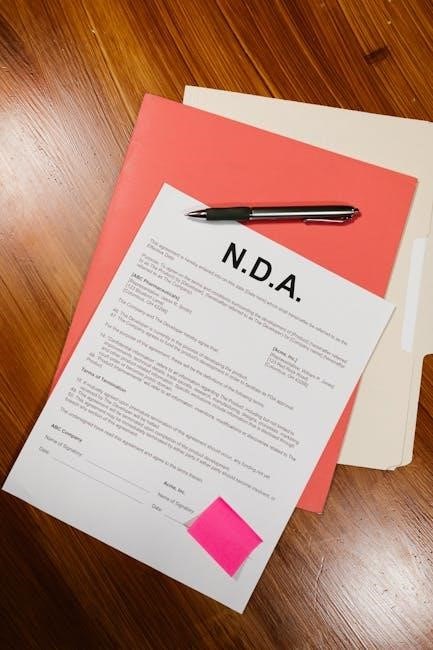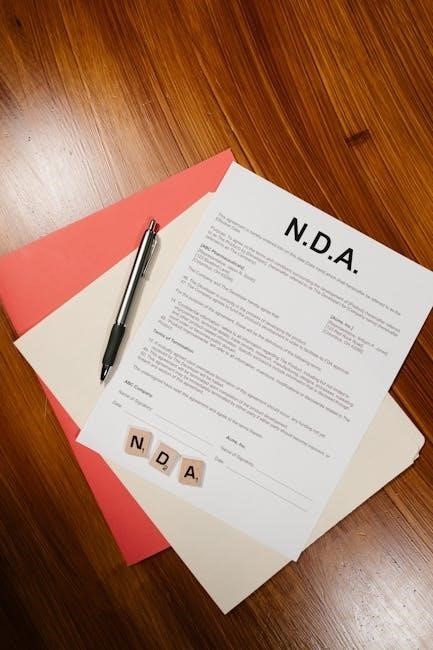A real estate non-disclosure agreement (NDA) is a legally binding contract that protects confidential information shared during property transactions, ensuring privacy and trust between all parties involved.
What is a Real Estate Non-Disclosure Agreement?
A real estate non-disclosure agreement (NDA) is a legally binding contract used to protect confidential information shared during property transactions. It ensures that sensitive details, such as financial data or property specifics, remain private. Typically, NDAs are signed between buyers and sellers or their representatives to maintain confidentiality. This agreement is not an offer to sell but safeguards the privacy of all parties involved. It outlines the terms for handling confidential information and is essential for maintaining trust and security in real estate dealings. NDAs are commonly used in both commercial and residential transactions to prevent unauthorized disclosure of sensitive information. They are a cornerstone of professional and secure real estate negotiations.
Importance of Confidentiality in Real Estate Transactions
Confidentiality is crucial in real estate transactions to protect sensitive information and maintain trust between parties. Without it, sensitive data like property valuations, financial details, or strategic plans could be exposed, potentially harming negotiations or business relationships. NDAs ensure that only authorized individuals access confidential information, reducing the risk of leaks. This protection is vital for both sellers, who may share proprietary data, and buyers, who may disclose their financial capabilities. By safeguarding privacy, confidentiality fosters a secure environment for negotiations, enabling all parties to engage openly and confidently. It is a fundamental aspect of professional and ethical real estate practices.
Definition and Purpose of a Real Estate NDA
A real estate NDA is a legal contract that defines the terms of confidentiality, outlining the scope and duration of information sharing between parties.
Protecting Sensitive Information in Real Estate Deals
Protecting sensitive information in real estate deals is crucial for maintaining trust and preventing unauthorized use of confidential data. An NDA ensures that all parties involved understand their obligations to keep shared information private. This includes financial details, property valuations, and strategic plans. By legally binding recipients to confidentiality, NDAs safeguard the interests of both buyers and sellers. They also outline consequences for breaches, providing a clear framework for handling sensitive information responsibly. This protection is essential for maintaining professional integrity and ensuring smooth transactions in the competitive real estate market.
Key Elements of a Real Estate Non-Disclosure Agreement
A real estate NDA typically includes the names and roles of all parties involved, a clear definition of what constitutes confidential information, and the duration of the agreement. It outlines the purpose for which the information may be used, ensuring it is solely for evaluating the property. The agreement also specifies the obligations of the recipient to maintain confidentiality and not disclose information to third parties. Additionally, it may include clauses regarding the return or destruction of confidential materials upon request and the consequences of breaching the agreement. These elements work together to protect sensitive data and ensure accountability among all parties involved in the transaction.
Structure and Components of a Real Estate NDA
A real estate NDA outlines the parties involved, defines confidential information, specifies the agreement’s duration, and details the obligations of the recipient to maintain privacy and limit disclosure.
Parties Involved in the Agreement
In a real estate NDA, the parties typically include the seller or landlord (as the disclosing party) and the buyer or tenant (as the receiving party). Agents or brokers may also be involved, acting on behalf of either party. The agreement clearly outlines the roles and responsibilities of each party, ensuring that the disclosing party’s confidential information is protected. Both parties are legally bound to adhere to the terms, which often include restrictions on sharing information with third parties without consent. This ensures that all discussions and negotiations regarding the property remain confidential and are used solely for the purpose of evaluating the transaction.
Scope of Confidential Information
The scope of confidential information in a real estate NDA typically includes financial details, property valuations, operational data, and any sensitive information related to the property or transaction. This information is shared solely for the purpose of evaluating the property or conducting negotiations. The agreement specifies that all disclosed materials, whether written or oral, are considered confidential and must be treated as such. The receiving party is obligated to maintain the confidentiality of this information and may not disclose it to third parties without prior consent. The scope ensures that both parties understand what information is protected and how it should be handled.
Duration of the Agreement
The duration of a real estate NDA specifies how long the confidentiality obligations remain in effect. Typically, the agreement outlines a specific term, such as several years, during which the receiving party must maintain confidentiality. Even after the primary term ends, certain provisions may persist, especially for trade secrets or highly sensitive information. The duration ensures that the disclosed information remains protected beyond the immediate transaction, safeguarding the disclosing party’s interests. It’s crucial to define this period clearly to avoid ambiguity and ensure both parties understand their ongoing responsibilities regarding the confidential information shared during the real estate transaction or negotiation process.

Types of Real Estate Non-Disclosure Agreements
Real estate NDAs vary, primarily distinguishing between commercial and residential agreements, each tailored to specific transaction needs, ensuring confidentiality for property-related sensitive information shared between parties.
Commercial Real Estate NDA
A commercial real estate NDA is specifically designed for transactions involving commercial properties, protecting sensitive financial and operational information shared between sellers, buyers, and agents. This agreement ensures that all disclosed details, such as property valuations, lease terms, and business operations, remain confidential. It is commonly used when potential buyers or investors are evaluating commercial properties, safeguarding the seller’s interests. The NDA outlines the scope of confidentiality, the purpose of information use, and the consequences of breaches, providing a legal framework to maintain privacy throughout negotiations. It is essential for maintaining trust and professionalism in commercial real estate dealings.
Residential Real Estate NDA
A residential real estate NDA is used when sellers share sensitive information about a property with potential buyers or agents. This agreement ensures confidentiality, protecting details like property valuations, ownership history, and personal financial information. It is often implemented during private negotiations or when discussing off-market listings. The NDA prohibits the unauthorized use or disclosure of shared information, safeguarding the seller’s privacy. It is particularly useful in high-stakes or sensitive residential transactions, helping to build trust and maintain fairness throughout the process. Breaching the agreement can lead to legal consequences, making it a crucial tool for protecting all parties involved in residential real estate dealings.

Why Use a Real Estate Non-Disclosure Agreement?
A real estate NDA ensures confidentiality, protecting sensitive information shared during transactions. It builds trust and prevents unauthorized use or disclosure, safeguarding privacy and fostering secure negotiations between parties.
Protection of Seller’s Confidential Information
Protecting a seller’s confidential information is crucial in real estate transactions. An NDA ensures that sensitive data, such as property valuations, financial details, and strategic plans, remains secure. By legally binding buyers or potential partners, sellers can prevent unauthorized disclosure. This safeguard not only maintains privacy but also upholds the seller’s competitive edge. Without such protection, sensitive information could be misused, potentially harming the seller’s interests. Thus, an NDA is an essential tool for securing trust and confidentiality in high-stakes real estate dealings.
Maintaining Privacy in Property Transactions
Maintaining privacy in property transactions is essential, especially when dealing with sensitive information. A real estate NDA ensures that all confidential details shared between parties remain private. This is particularly important for high-profile or luxury properties where discretion is key. By legally binding recipients to confidentiality, sellers and agents can control the flow of information, preventing leaks that could affect property value or attract unwanted attention. Privacy also protects buyers by keeping their interest and negotiations confidential. This mutual protection fosters trust and ensures smooth, secure transactions, making NDAs a cornerstone of professional and ethical real estate practices.
Legal Considerations and Enforceability
Real estate NDAs must comply with local laws to ensure enforceability. Jurisdiction and governing law clauses clarify legal boundaries, protecting both parties’ interests in case of disputes.
Understanding the Legal Implications
A real estate non-disclosure agreement (NDA) is a legally binding contract that protects sensitive information shared during property transactions. It ensures that confidential details, such as property valuations, financial terms, and negotiation strategies, remain private. Breaching an NDA can result in legal consequences, including fines and damages. Understanding the legal implications is crucial for both buyers and sellers, as it outlines the responsibilities and obligations of all parties involved. Compliance with local laws and jurisdictional requirements is essential to maintain enforceability. Properly drafted NDAs help prevent disputes and safeguard the interests of all parties, ensuring a smooth and secure transaction process.
Jurisdiction and Governing Law
Jurisdiction and Governing Law
A real estate non-disclosure agreement (NDA) must specify the jurisdiction and governing law that will apply in case of disputes or legal actions. This ensures clarity and consistency in resolving conflicts. Typically, the parties agree on a specific jurisdiction, such as the state where the property is located, to avoid ambiguity. The governing law clause outlines which legal framework will be used to interpret the agreement. It is essential for enforcing the NDA, as laws vary by jurisdiction. Including this clause helps prevent legal complications and ensures that all parties are aware of the applicable legal standards and procedures. Proper jurisdictional wording is crucial for enforceability and compliance with local regulations.

How to Create a Real Estate Non-Disclosure Agreement
Creating a real estate NDA involves outlining the parties, scope of confidentiality, and terms. Include signatures, dates, and governing law to ensure enforceability and compliance with legal standards.
Step-by-Step Guide to Drafting an NDA
Identify the Parties: Clearly define the parties involved, including the seller (discloser) and the buyer (recipient), with their full legal names and contact information.
Define Confidential Information: Specify what constitutes confidential information, such as property details, financial data, or other sensitive information related to the real estate transaction.
Outline Obligations: Detail the recipient’s responsibilities, including the use of information solely for evaluating the property, and the requirement to maintain confidentiality.
Specify Duration: Determine the timeframe for confidentiality obligations, whether it’s a specific period or indefinite, ensuring it aligns with the transaction’s nature.
Include Breach Consequences: Describe the repercussions of breaching the agreement, such as legal action or damages, to protect the seller’s interests.
Governing Law: Indicate the jurisdiction whose laws will apply in case of disputes, ensuring clarity and consistency in legal matters.
Termination Clauses: Outline conditions for terminating the agreement, including notice periods and immediate termination for breaches.
Exclusions and Exceptions: Address situations where confidentiality may not apply, such as legally required disclosures or public information not caused by the recipient.
Execution and Formalities: Ensure the agreement is signed by both parties, possibly with witnesses, to enhance its enforceability.
Legal Review: Have the draft reviewed by a legal professional to ensure compliance with current laws and to avoid any ambiguities or omissions.
By following these steps, you can create a comprehensive and enforceable real estate NDA that protects sensitive information and clarifies the roles and responsibilities of all parties involved.
Using Templates for Efficiency
Using templates for real estate non-disclosure agreements (NDAs) streamlines the process, saving time and reducing errors. PDF templates are widely available and provide a structured format, ensuring all essential elements are included. They typically cover key sections like confidentiality obligations, scope of information, and duration. Templates also help maintain consistency, reducing the risk of omitting critical details. Additionally, they allow users to focus on customizing specific clauses rather than drafting from scratch. Many templates are pre-approved by legal professionals, enhancing enforceability. By leveraging templates, parties can efficiently create a robust NDA tailored to their needs, ensuring clarity and protection for all involved.
Best Practices for Implementing an NDA
Ensure NDAs are tailored to specific transactions, clearly defining confidential information and obligations. Regular legal reviews and staff training enhance compliance and effectiveness in real estate deals.
Ensuring Compliance with Legal Standards
Compliance with legal standards is crucial when implementing a real estate NDA. Ensure the agreement aligns with local, state, and federal laws, including intellectual property and privacy regulations. Regularly review and update the NDA to reflect legal changes, such as evolving data protection laws. Consulting with legal experts can help mitigate risks and ensure the NDA is enforceable. Properly defining confidential information and specifying the recipient’s obligations are key steps in maintaining legal compliance. Additionally, including jurisdictional clauses and governing law provisions ensures clarity in case of disputes, safeguarding all parties’ interests effectively.
Maintaining Record-Keeping Practices
Efficient record-keeping is essential for managing real estate NDAs. Maintain detailed records of all agreements, including signed copies and dates of execution. This ensures accountability and provides evidence in case of disputes. Properly store both physical and digital versions, ensuring secure access and compliance with data protection laws. Regular audits of NDA records help verify compliance and identify potential gaps. Accurate documentation of confidentiality terms, durations, and scope minimizes misunderstandings. Implementing organized filing systems and digital tools streamlines access and management, safeguarding sensitive information and facilitating quick retrieval when needed. Proper record-keeping practices uphold transparency and trust in real estate transactions.

Potential Breaches and Consequences
Violating a real estate NDA can lead to legal action, financial penalties, and reputational damage, emphasizing the importance of adhering to confidentiality terms to avoid severe repercussions.
Understanding the Risks of Non-Compliance
Non-compliance with a real estate NDA can result in severe legal and financial consequences, including lawsuits, monetary damages, and loss of business credibility. Breaching confidentiality may lead to the disclosure of sensitive information, undermining trust between parties. Legal penalties can include injunctions to prevent further breaches and compensatory damages to offset losses. Additionally, non-compliance can harm professional reputations, making it harder to secure future deals. It is crucial for all parties to adhere to the terms of the agreement to avoid these risks and maintain the integrity of the transaction process. Understanding these risks emphasizes the importance of strict compliance.
Legal Remedies for Breach of Confidentiality
A breach of a real estate NDA can lead to legal remedies, including injunctive relief to stop further disclosure of confidential information. Courts may award monetary damages for actual losses caused by the breach. In some cases, punitive damages may be imposed to deter similar violations. Additionally, the breaching party may be required to cover the plaintiff’s attorney’s fees and costs. Legal action can also include claims for misappropriation of trade secrets or unfair business practices. These remedies underscore the seriousness of maintaining confidentiality and the potential consequences of failing to uphold the terms of the agreement in real estate transactions.

The Future of Real Estate Non-Disclosure Agreements
The future of real estate NDAs lies in digital transformation, with electronic signatures and streamlined processes enhancing efficiency while maintaining confidentiality and legal enforceability in property transactions.
Digital Transformation and Electronic Signatures
Digital transformation is revolutionizing real estate non-disclosure agreements through electronic signatures, enabling faster and more secure transactions. This shift streamlines the signing process, reduces paperwork, and enhances efficiency. Electronic signatures allow parties to execute NDAs remotely, maintaining confidentiality and expediting deals. Advanced encryption and digital authentication ensure the integrity of sensitive information. As technology evolves, e-signatures are becoming the norm, offering a seamless experience for buyers, sellers, and agents. This modern approach not only saves time but also aligns with global trends toward paperless and automated processes, ensuring real estate transactions remain secure and compliant with legal standards.
Evolution of Confidentiality in Real Estate
Confidentiality in real estate has evolved significantly, driven by the increasing complexity of transactions and the need to protect sensitive information. Historically, confidentiality was handled through verbal agreements and basic written contracts. Today, NDAs are sophisticated legal tools, outlining clear obligations and consequences for breaches. The rise of digital platforms and electronic documentation has further enhanced confidentiality measures, ensuring that sensitive data remains secure. As real estate transactions become more global, the importance of robust confidentiality agreements continues to grow, safeguarding both parties’ interests and maintaining trust in the marketplace. This evolution reflects the dynamic nature of the real estate industry and its legal landscape.
